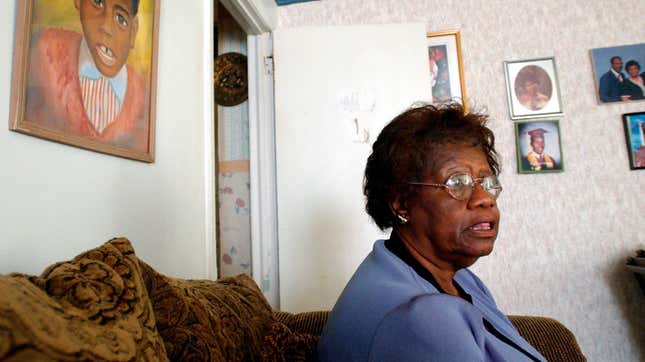
In light of the recent losses of civil rights icons Rep. John Lewis and Rev. C.T. Vivian, America, now in the throes of what is widely recognized as a revived civil rights movement, has had ample cause to reflect on some of the movement’s pioneering personalities and changemakers. And as we celebrate those legacies, there is yet another among them who deserves recognition: educator, political activist and former Democratic delegate Emma Sanders, who died on June 24 in Brandon, Miss. Sanders was 91.
A Mississippi native and the great-granddaughter of slaves, Sanders began her career in civil rights via an unconventional route. A graduate of what is now Alcorn University, she was a former schoolteacher, business school owner (with husband William), and notably, an assistant to Democratic Representative Wayne Dowdy when she became active in the naming of the first federal building in the nation for a Black person, the Dr. A.H. McCoy Federal Building in Jackson. When Sanders’ son Everett became active in an anti-segregation campaign in the early 1960s, she and her husband joined the cause as well.
“She didn’t want her own children to become involved in something that she didn’t have a very strong understanding of,” grandson Keelan Sanders, the first Black executive director of the Mississippi Democratic Party, told the New York Times.
“Most Black parents were telling their kids, ‘You can’t do this, it’s too dangerous,’” said fellow activist, educator and theologian Rev. Edwin King. “She decided as a mother that some adults needed to be involved.”
Mrs. Sanders would prove to not only be an adult in the room but a force in the movement. During what would become known as Freedom Summer in 1964, she and her family, who owned a restaurant in Jackson, helped to organize, feed and house voting registration activists. It was the same summer fellow Mississippian James Chaney, along with New Yorkers Andrew Goodman and Michael Schwerner, were murdered in retaliation for their registration efforts in the region.
Sanders would become a co-founder of the Mississippi Freedom Democratic Party that same year, fighting alongside Rev. King and fellow civil rights icons Ella Baker, Bob Moses, Fannie Lou Hamer and more to bring what the Times called an “impassioned challenge to an all-white delegation at the 1964 Democratic National Convention” in Atlantic City, N.J.
“She never expected any acclaim,” recalled Rev. King. “But she would inspire people. Not like Fannie Lou Hamer, with magnificent speeches on the stump, but in the day-to-day managing of the party without ever pronouncing that ‘this is the way we have to do it.’”
In what would become a historic standoff, the Democratic party infamously refused to seat the Freedom Democrats among the other delegates. The Freedom Party’s resistance forced a compromise, brokered by Dr. Martin Luther King, Jr., which resulted in “two symbolic at-large slots and required white delegates to sign a pledge that the next delegation would be integrated,” the Times recounted.
Infuriated, the all-white delegation stalked off the convention floor in protest, leaving their seats open appropriated by Freedom Party delegates. Their temporary integration of the floor resulted in a public skirmish when guards tried to remove the black delegates. That year, Sanders would become a plaintiff in a lawsuit to include the names of Black candidates on ballots; a moment that would ultimately prove transformative in American politics, ultimately ending segregated delegations.
“We came back and worked hard to get the Democratic nominee elected, so they could not say we were disloyal to the party,” Sanders told author Bob Moser in 2008's Blue Dixie: Awakening the South’s Democratic Majority. “But the regular Democratic Party was not ready to accept us.” Nevertheless, the Times notes: “in 1968, the Freedom Democrats, reconstituted as the Loyal Democrats of Mississippi, were seated as the state’s official convention delegation.” Sanders herself would appear as a legitimate delegate at numerous subsequent conventions, beginning in 1972, and was present to see both Barack Obama accept the Democratic presidential nomination in 2008 and Hillary Clinton become the first female nominee in 2016.
Additionally, Sanders would achieve her own political milestone in 1966, running for Congress as an Independent, opposing segregationist Democrat John Bell Williams. While Sanders didn’t unseat the incumbent, she was proud of the effort, saying (h/t the Times): “We ran strong, and that was a revelation. The year after, in 1967, we were able to elect Blacks in local elections.”
Sanders would become executive vice chair of the Mississippi Democratic Party but would maintain her independent streak throughout the remainder of her life, reportedly supporting Bernie Sanders in the primaries of his presidential runs. But one of her biggest campaigns found success just days after her death when the Confederate symbol was removed from the Mississippi State Flag on June 28. Sanders had been advocating for its removal for decades. While she may not have lived to see the triumph in person, her legacy endures, both in her home state and in the political commitment of her family, Keelan Sanders told The Jackson Free Press.
“She lived a long, giving and unselfish life on behalf of Mississippi and lit a fire for her children to carry the torch for her.”

